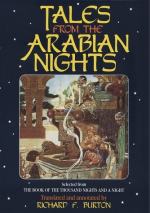[FN#414] Here begins the second tale which is a weak replica of Galland’s “Two Sisters,” &c.
[FN#415] This is the usual term amongst savages and barbarians, and during that period the father has no connection with the mother. Civilisation has abolished this natural practice which is observed by all the lower animals and has not improved human matters. For an excellent dissertation on the subject see the letter on Polygamy by Mrs. Belinda M. Pratt, in “The City of the Saints,” p. 525.
[FN#416] In text “Kuwayyis,” dim. of “Kayyis,” and much used in Egypt as an adj. = “pretty,” “nice,” and as an adv. “well,” “nicely.” See s.v. Spitta Bey’s Glossary to Contes Arabes Modernes. The word is familiar to the travellers in the Nile-valley.
[FN#417] In Arab. a “Kanat;” see vol. iii. 141. The first occupation came from nature; the second from seeing the work of the adopted father.
[FN#418] Abu Niyyah, like most house masters in the East, not to speak of Kings, was the last to be told a truth familiar to everyone but himself and his wife.
[FN#419] The Ms. breaks off abruptly at this sentence and evidently lacks finish. Scott (vi., 228) adds, “The young princes were acknowledged and the good Abou Neeut had the satisfaction of seeing them grow up to follow his example.”
In the Ms. this tale is followed by a “Story of his own Adventures related by a connection to an Emir of Egypt.” I have omitted it because it is a somewhat fade replica of “The Lovers of the Banu Ozrah” (Vol. vii. 177; Lane iii. 247).
[FN#420] Mr. Chandler remarks (p. 25, “On Lending Bodleian Books, &c."):—“It is said that the Curators can refuse any application if they choose; of course they can, but as a matter of fact no application has ever been refused, and every name added will make it more and more difficult, more and more invidious to refuse anyone.” I have, therefore, the singular honour of being the first chosen for rejection.
[FN#421] Mr. Chandler’s motion (see p. 28, “Booklending, &c.”) was defeated by an amendment prepared by Professor Jowett and the former fought, with mixed success, the report of the Committee of Loans; the document being so hacked as to become useless, and, in this mangled condition, it was referred back to the Committee with a recommendation to consider the best way of carrying out the present statute. The manly and straightforward course of at once proposing a new statute was not adopted, nor was it even formally proposed. Lastly, the applications for loans, which numbered sixteen were submitted to the magnates and were all refused! whilst the application of an Indian subject that MSS. be sent to the India Office for his private use was at once granted. In my case Professors B. Price and Max Muller, who had often voted for loans, and were willing enough to lend anything to anybody, declined to vote.
[FN#422] According to the statutes, “The Chancellor must be acquainted with the Business (of altering laws concerning the Library), and he must approve, and refer it to the Head of Houses, else no dispensation can be proposed.”




